Iwori Bogbe: Meaning, what is born sayings, patakies and more

Iwori Bogbe is the combination between the Ojú Odù Iwori and Ogbe, it is Odu number 47 of the Ifa genealogy, it represents the tidal wave and the different transformations of the Orisha Olokun. This sign refers to the ties we have with our elders and ancestors, they guide us based on the experience they acquired over time.
It is important for the Babalawos to study the arts of Ifa, since they will be able to solve their problems and those of their godchildren or clients through divination and respective sacrifice.
In Iwori Ogbe, Ifá says that a friend advises this person against a pressing situation. The advice is good and that the friend will lead you to a good destination. He should adhere to this friend and not lose him, and vice versa, if he offers the advice to the people, it will lead the people to a good ending.
Other names of the Oddun Iwori Ogbe:
Iwori Bogbe.
In the odu Iwori Bogbe is born:
- The ant.
- Injuries and insults.
- The bush of ATORI -Pasiflora-
- The marine tornado.
- The transformations of OLOKUN and the different figures of the Human Being.
- The inescapable need to study IFA.
What is the sign of Ifa Iwori Bogbe talking about?
- Iwori Bogbe marks lack of control of the Great Sympathetic and the Altered Nervous System.
- It marks big problems with the gallbladder.
- Of diseases produced by nervous debauchery.
- Talk about mental illness.
- The women paid the men's debts and they, embarrassed, left their side.
- It was where ORUNMILA and his wife went to live in the Copa de la Ceiba.
- There are fouls with SHANGO.
- The Father abandons the son.
- The traveling pigeon speaks that leaves the empty pigeon.
- It is where Ebó is ordered to have a house and not die on the street.
- You cannot borrow money or clothes.
- Drinking alcoholic beverages is prohibited.
- In Iwori Bogbe OLODUMARE granted YEMAYA control of the sea and OSHUN that of the river.
- The goat was saved by making Ebbo.
It may interest you: Treatise of the sign of Ifa Iwori Meyi
Recommendations of the Iwori Bogbe sign:
- For this Sign of Ifa a goat is fed to the Hormiguero. "The ants were born here."
- He is an Ifá of misers and rogues, they do not like to pay their debts.
- Here the women paid the men's debts and they, embarrassed, left their side; speaks of separation of marriages.
- AWO IWORI BOGBE should never doubt the truth of Ifá.
- The son of this Ifá will have his life in constant torment, so he will live a stormy life.
Here the Injuries and the Affronts were born. The person is destined to experience daily grief. It is Ifá of unhappiness. - With this Ifá it takes a long time to prosper. Here the person is resistant to the adversities of life.
Here the ATORI bush (passionflower) was born. - Iwori Bogbe is a relief Oddun. Guardian of the Ebbó.
- You have to stand still to separate a woman EGUN who stands between you and your spouse, and who brings you great problems in your married life. The moment you are irradiated by that EGUN, you reject the attentions and caresses of your spouse. Other times it is your spouse who rejects you.
- By this Sign of Ifá, Ebbo is made with the clothes that one has on and is buried on the shore of the sea.
Iwori Bogbe Sayings:
- Fallen tree leaves, toys of the wind are.
- Wash heads, so that they come out stained.
- You are not a dog that follows its master.
- Everything is not known, everything that is known is a part of what is not known.
- I give everything I know to know what I do not know.
- Death is preferable to humiliation.
- You can hear but you cannot see what is going on behind the wall.
- The wisdom of others prevents the boss from being called a fool.
- He who studies IFA without thinking, is lazy. Thinking about IFA without studying it is dangerous.
- Ignorance of consulting IFA makes you look up, but there is no oracle on the ceiling.
- Gone With the Wind.
Ifa code of ethics of the odu Iwori Bogbe:
The Awó does not question the word of Ifá.
Iwori Ogbe bans:
- It cannot be wet with rainwater because it destroys it.
- AWO IWORI BOGBE should not work Ifá when there is a storm or air storm. In that case, you will need to mark your Odu on the ground, kneel down and pray your Oddun, and put your head on the mark.
- You do not eat corojo, or any kind of pigeons.
- It is an Odu of food and drink. You have to dress in fringed fabrics.
- In this sign, you cannot walk in mud.
- When Iwori Bogbe is seen in Divination, the Awó is sent to study Ifá.
- Here you should not drink alcoholic beverages, as that will be their physical and moral destruction.
Ifa Iwori Ogbe's odu speaks of:
- You live in stealth, oddun of alternative, of character. This was where ORUNMILA and his wife went to live in the Copa de la Ceiba.
- The marine tornado was born. Ifá of fault with SHANGO.
- For this Ifá, the Father abandons the son. The traveling pigeon speaks, leaving the pigeon empty.
- OLOKUN's great transformations were born.
- It is an Ifá of women of life.
- This Ifa Sign predicts that the Earth is going to fall apart with wars, that the World is being destroyed and that the Babalawos make Ebo so that ORUNMILA compose it.
- Here SHANGO is given a ram and ORUNMILA two black hens to avoid the disease.
- For this Odu, precautions must be taken with children because they can drown in the sea.
- When Awó wants to solve a problem, he orders the Apetebí to put on a red collar and carry a small goat on her back to give to Eshu.
- He was born in Iwori Bogbe because the Awoses have the inescapable need to study Ifá, because at the beginning of the world men knew little and did everything.
Meaning of the Sign of Ifa Iwori Bogbe
- When this Ifá is seen, the person is told that SHANGO has failed, that he offered him a promise and has not fulfilled it and that is why SHANGO is angry with him.
- Here you can not lend neither clothes nor money, so that luck does not go away.
- Here it is said that the Guardian Angel has left and must be brought so that it does not die.
- When this Ifá is seen, a Babalawo or an Olosha will die, within seven days. AWO IWORI BOGBE is left alone in life.
- For this Odu, you have to be obedient not to get lost.
- For prosperity, you will need to raise a pigeon from the country and another from the city in your home, and encourage the breeding.
- There are stomach disorders, caused by nerves or by damage that you were given to drink or eat a long time ago.
- Because of this sign of Ifa, El Awó Iwori Bogbe will have to change land and will always have to have his Eguns and IFAs.
- Here you have to receive: ODUDUWA, OSANYIN, OLOKUN, swear in ORUN, receive OYA and receive OLOFIN.
- When this Ifá comes out in a Plant, whether it is ATEFA, ITA, IYOYE, IKOFAFUN or AWAFAKAN, the Godfather will become Ebó with all the clothes he has on, a rooster, jutía, smoked fish, toasted corn and he will take it to the sea and there buries it.
- This Ifá speaks of a changed Saint or of poorly done Saint ceremonies. The person is the child of a
Santo and they made another one. - When in this Ifá he is obedient, he has the ability to quickly get rid of everything that hurts him, be it people or vices.
- Here he saves himself by making Ebó.
- With this Odu, one should receive: OLOKUN, ODUDUWA, OSANYIN, OYA, OLOFIN.
Oddun of Ifa Iwori Bogbe For Women:
- The wife of this Odu suffers from a menstrual disorder, produced by the nerves.
- Beware of abortions. Do Ebo to achieve pregnancy. Pay him what he owes SHANGO.
- Beware of having children of different men.
- Woman: You should receive IKOFAFUN and do Santo.
Iwori Bogbe For Men:
- You have a very stupid wife and when she does something to you, you leave her; and when you feel bravado, you call her again and then she tells you what you don't like to hear.
- You have to do Santo, possibly SHANGO and then do Ifá.
It may interest you: Sign of Ifa Ogbe Weña
Says Ifa Iwori Ogbe
That you be careful, that in seven days a boy has to die, because there are bad winds. Two women are fighting with you. Be careful with the door of your house, because they may be throwing you some bad powder.-Give thanks to the dream you had last night with OSHUN.
You have to be presented with a very foolish woman, ignore her and endure her. Feed OLOKUN. He cannot lend money or lend his clothes, as this delays him. Be careful, in seven days you will have a tragedy with a person.
Give thanks to SHANGO and pay him what you promised him.- SHANGO did not let his opponent beat him with the Mayombe rule. Do not play hands, because you have to hit a person who does not suit you. You cannot kill ants, even if they exist in your home. You have to be careful because you may lose your home. If your wife is pregnant, be careful not to lose her belly. You cannot abandon your child and you have to take good care of him.
Be careful, do not change the Guardian Angel or do the Holy wrong. If you are obedient, you have the ability to quickly get rid of everything that hurts you. You have to be careful with vices because they can lose it in life. He cannot drink alcoholic beverages because he can become alcoholic, he suffers from an upset stomach, produced by the nerves or by damage that they gave him to drink or eat. You have a dead man standing between you and your spouse, you cannot get wet with rainwater.
Prayer of the Odu Iwori Ogbe:
IWORI BOGBE IFA SHE OMO LERI IFA BEYAWE AFEFELORUN IRE ABEYEBI LORI
IFA. IWORI BOGBE ASHE BI ASHE ALEYO BI ASHE IWORI BOGBE LORI IFA ABEYERI
LODE IFA AWA MAYARAWA IFA KAFEREFUN ESHU, SHANGO ATI OBINI MEYORA IFA
ASHE KAYEGBE ASHE IFA LORI IFA. IFA ASHEGUN OTA MOLALA AGBERE NI LORUN
ISORI MEJI ORUNMILA ASHE BO, ASHE TO ARIKU BABAWA IFA SHE LORI IFA ..
Suyere of the Iwori Bogbe Sign:
IKU ORUN LEYUN BARALA KUALE LUALAYE
Chorus: ONI KUARE LOKUSHIN EYELE "
Iwori Ogbe Brand:
- The Iwori Bogbe Sign marks the Great Sympathetic out of control, which alters the person's entire nervous system and makes him seem crazy. They also have serious problems with the gallbladder, causing great disorders in the digestive system.
Iwori Bogbe Notes:
- Usually, the diseases that affect this Odu (Iwori Bogbe) are produced by nervous debauchery, giving rise to stomach ulcers, asthma attack, schizophrenia, temporary insanities, which can threaten you or others.
- Everything lies in mental illnesses and you have to do Ebó, so as not to perform abnormal acts in which you can lose your life or destroy the happiness of the family.
Herbs (Ewe) of the Odu Iwori Ogbe:
- Cedar.
- moruro.
- Tuo Tuo.
- Freshness.
Learn: The Odu of Ifa and their Meaning
Iwori Bogbe Ifa Traditional Nigerian
ÌWÒRÌ OGBÈ
Ìwòrìbogbè eye oko
A day fún Òrúnmìlà
Bábá jí
Baba ò rówó kan á á yóó ná
Do you even read lájé lówó báyìí?
Wón ní ó rbo
Wón nire ajé fún Baba
Wón lójú ò níí pon on
Lésò lésò nire or móo bá a
Òrúnmìlà rubo
Ó ru òpòlopò okàa Bàbá
ati owó
Wón da gbogbo è sójú opón
hey hey
N ní wá n jó ní wá n yò
Ní n yin àwon Babaláwo
Àwon Babaláwo n yin Ifá
Ó ní béè làwon Babaláwo tòún wí
Ìwòrìbogbè eye oko
A day fún Òrúnmìlà
Bábá jí
Baba ò rówó kan á á yóó ná
Wón ni ebo ni kí Bàbá o se
Òrúnmìlà gbébo nbè ó rbo
Ajé gbá rere wa
Koo waa ba mi
Àdàbà sùsùùsù gbá rere wa
Kó waá jeka
Aya gbe rere wa
kó waá bá mi
Àdàbà sùsùùsù gbá rere wa
Kó waá jeka
Omo gbe rere wa
kó waá bá mi
Àdàbà sùsùùsù gbá rere wa
Kó waá jeka
Ire gbogbo gbá rere wa
kó waá bá mi
Àdàbà sùsùùsù gbá rere wa
Ko waa jeka.
Ifá foresees for a person the good fortune of wealth, children, and long life. He must make sacrifice.
Ìwòrì bogbè The farm bird, Guessed for Òrúnmìlà
When Baba woke up daily
And he complained because he couldn't find any money to spend
He asked How can I save money?
They advised him to make the sacrifice
They assured him that the good fortune of wealth will be with him
That he will never know anything about scarcity
And in continuous streams, your good news will come
Òrúnmìlà offered the sacrifice
He offered a lot of sorghum
And money
Everything was poured over the face of the Ifa tray
Life pleased him
He began to dance and rejoice
He praised his Babaláwo.
His Babaláwo praised Ifá
He said it was exactly as his Babaláwo had said
Ìwòrìbogbè The farm bird
Guessed for Òrúnmìlà
When Baba woke up daily
And he complained because he couldn't find any money to spend
They advised Baba to offer sacrifice and he offered it
Wealth, come in great crowds
Come to me
Àdàbà sùsùùsù, come all
And eat the sorghum
Women, come to large crowds
Towards me
Àdàbà sùsùùsù, come all
And eat the sorghum
Children, come in large crowds
Towards me
Àdàbà sùsùùsù, come all
And eat the sorghum
All good things, come crowds
Towards me
Àdàbà sùsùùsù, come all
And eat the sorghum.
It may interest you: All about the sign of Ifa Iroso Umbo
Iwori Ogbe's Ebbo:
Secret of IWORI BOGBE
You will have to do this Ebó: 1 rooster, a black hen, a white hen, a stone from the sea, fallen leaves from different trees, Ceiba stick, garbage from a whirlpool of air, whirlpool earth, earth from the foot of a Ceiba, piece of beef, piece of pork, roasted corn, parboiled corn, four pieces of bread, four Ekó, hutía and smoked fish, corojo and cocoa butter, brandy, honey, osun naború, ero, obi, kolá , obi motiwao, aira, orogbo, anum.
The rooster is given to the sea stone, which must be from OLOKUN, along with SHANGO, the rooster's head is placed on top of the stone. The black hen is given to IFA's elder hand, from the head of the AWO IWORI BOGBE. This black hen is presented to him on the head of the Awó, praying:
"ORUNMILA ELERIPIN ORUMALE ISOTA OYEYE EGUN ONIBARA NIREGUN"
The white hen is given to the lower hand of IFA, from the head of the Awó. Later, it appears to him in the head, singing:
"ODUDUWA ORI IKU ONANA AFEFE ORI IKU AGBA ORUN IOKUN ODUDUWA AKUALOSINA ONAGUEDE ODUDUWA ONIBARA NIREGUN".
While these chickens are being given, it is sung:
"AGBA ORUNMILA ORI BAWA ORI IFA ORI ODUDUWA IFA AWALORUN ONAWAYANO OLORUN."
Later, AWO IWORI BOGBE is ordered to pluck the two bodies of the chickens and throw them to Ifá, so that they fly and are watered inside the room. And, as he does so, he sings:
«JIUN JIUN BOW, JIUN JIUN BOW AGBELE IFA, JIUN JIUN BOW»
The black hen's iñales are cooked and put in the larger hand and added with corojo butter, jutía and smoked fish, toasted corn and the Awó tasted at the time of putting it in.
The white hen's iñales are cooked and boiled yam, cocoa butter, husk, four pieces of bread or Ekó are added to it and the Awó, after tasting it in front of ORUNMILA, is placed on the smaller hand, invoking ODUDUWA .
After this, AWO IWORI BOGBE, he makes two Ebo.
1st EBO with: The stone of OLOKUN, the head of the rooster, the collected leaves, the garbage and the earth of the whirlpool of air, the earth of the foot of Ceiba, piece of beef, a lot of ashé, pork, tender corn cooked, bread or EKO. It goes to the foot of a Ceiba tree.
2nd EBO with: Four pieces of bread or Ekó, the iñales of the two hens, the feathers, household garbage, jutía and smoked fish, corojo butter, toasted corn. This Ebó goes to the seashore.
If AWO IWORI BOGBE has OLOKUN, he will eat on the third day with ORUNMILA.
Patakie of the Iwori Bogbe sign:
When Osun and Eshu saved Iwori Ogbe
Along this path, there was a time when Osun and ORUNMILA were good friends and loved each other very much.
For this reason, Osun was always giving advice to his friend ORUNMILA, but he never paid attention to him, because he believed himself superior to him because of the trust and ashé that OLODUMARE had granted him.
But it turns out that every day it got worse and Osun did not tire of advising him, but ORUNMILA continued to ignore him, since he continued to consider himself superior to resolve any matter, since everyone counted on him.
Osun, already tired, made up his mind and goes to see Olodumare and complains about how ORUNMILA was. OLODUMARE sent for him, scolded him and advised him, advice that for a time he followed. But then he continued as before, doing things as he pleased, for which reason he was losing, moments that his enemies took advantage of to surround him and tear off his head, which they did not achieve because Eshu got in the way, saving ORUNMILA, that was lost by stubborn and disobedient.
The prosperity of Iwori Ogbe
In this way the land of ABEYONI was poor. There lived an Awó called IFA FORE and he lived with great concern because his land was not prospering in anything.
One day his son, who was called IFA SHE, told him: - «My father, I need to go out for a walk to find your luck, mine and also that of our Earth». The Father got very angry with his son and punished him.
He began to cry and fell asleep, and began to dream of ORUNMILA and the latter told him in the dream to give him a white and a black hen, along with his head, to peel them well in front of him and sing to him:
«FEFELEKAN FELE FELE FEFELEKAN FELE FELE»
From those feathers that he was pulling out, a storm was going to form, which would later find it and there would be the fate of him and his land, and where he had to go to live. And this Earth would be called IFA BI ASHE.
The Awó woke up scared, he went to the patio of the house to gather the chickens, his father saw him and he was very angry. AWI IFA SHE told his Father what he dreamed of and he told him: - «This is all your lie».
Father lay down at the foot of a poplar tree in the courtyard and fell asleep. At that moment, IFA SHE took the hens and gave them to ORUNMILA and his head. Then Eshu came in and told IFA SHE that he couldn't leave right now. And Eshu began to sing:
“AFEFEKAN ORUN ORUNMILA IFA MERI BAYA BAYA IWORI AFEFE”
Then the storm formed and he grabbed IFA in his hand and went out together with Eshu and the father was left dead. And he continued along with his Ifá, because the storm could not be endured and Eshu was singing along the way:
"BAYERI IFA AFEFE ABEYERI SHANGO ABEYERI LON TO NI SHANGO ABEERI LONA NI SHANGO".
And they kept walking and Eshu said: Don't look back, the storm cleaned that Earth.
They arrived where SHANGO was and IFA SHE knelt in front of SHANGO and greeted him, and he said:
Put your Ifá on the floor and on the board, because in three days I have to do a ceremony, but now we are going to eat AMALA, ILA and ISHU, which is what I have to offer you. They sat down to eat, but IFA SHE kept thinking of his Father; and SHANGO said to himself: "Be calm, your luck is defined." For you to bring luck to Earth, this had to happen.
After three days, IFA SHE had already been convinced and SHANGO told him: -I am going to put you in luck that your father had to have left you so that she is always with you. He took SHANGO, wrapped it in poplar leaves, called his father's Egun, and gave him a white rooster. The Egun came and said: «You will have all my luck with that of ORUNMILA, SHANGO and ESHU. To have it, you will have to clarify a lot with ORUNMILA ». When SHANGO was at this ceremony, he made the call singing:
«FEFE NI EYA EYE EWA WAWA LORE FEFE NI YE EYE AWALODA EGUN YORUN
BAWA ORUNMILA AWA LODE TIMBELAYE AWA LODE »
They finished feeding EGUN, they took the rooster and put it in a jar and put four stones from the sea, four stones from the river and one from the jungle, a hand of a snail, bait, they threw guacalote, ox eye and They fed him along with IFA, a white and a black hen, they buried her and the big storm was tamed; where the feathers flew off and fell on the Land of INLE TOKA.
In that Earth were the Oshas, mainly OLOKUN, who was waiting for an Awó to rule that Earth. SHANGO said to IFA SHE: Go together with Eshu on the way to that Earth that sees there, which is where you will live well. Later I will go to visit you and there you have to find your mother, who will help you and has strength in that Earth. It is called ABEYONI.
So did this one. OLOKUN had told ABEYONI that an Awó who was his son was coming, so that she would help him when he reached his land.
The first one to enter was Eshu. ABEYONI, who had a gourd in his hand, said to OLOKUN: "This way comes Eshu." And OLOKUN said: -Your son is also coming. And she said to him: - «I don't see it. And Olokun and Abeyoni began to sing:
"AGOGO NILE AGOGO AWO IFA AGOGO NILE"
And suddenly IFA SHE appeared. He knelt in front of the mother and Olokun saw that all the feathers were watered. He gave his Ifa to his mother and Eshu and Olokun began to collect all the feathers for him to make Ebo.
The mother, Abeyoni, stopped him in the center of the land that he was going to rule, with all the crowded people.
But he said: - "Until Shango arrives, you have no voice or command." And he said to Eshu: - «Go find Shango, to be a witness, because he was the one who gave you the luck to find me. You will rule many lands, because you will have to walk, but this is your Earth. " At that moment, Eshu went to look for Shango and the people of that land did something for Ifá to live. Shango came with Eshu and said: -You have to make Ebo to everyone with earth. A wind formed and they began to pick up the dirt and leaves that were in the air.
IFA SHE did the Ebó. Abeyoni called Shango, Eshu and Olokun, and they went to under a poplar tree, where he said: - «My son, I know that you have feelings for me because I fought with your Father». And he told him everything that happened to him. «I had to go for a walk and I always wanted to have you by my side, but he didn't want to, so that you could pass work. But this Land in which I am, with riches, where all the Oshas that I rule and who have great faith in me come, was your Father's and he despised it and went to die in another land. "It's yours."
As it thundered, a wind was felt and a voice said: Sorry. And he said: - My luck is yours.
Shango consecrated it, took a banana, cooked it and ate it, threw an obi-kolá on it and gave it to IFA SHE with the heart and with the language of the banana he made an Inshe, with the obi-kolá. Then, from that moment, came the prosperity of IFA SHE - IWORI GBOGBE.
Note: This güiro is fed with Shango.
Gone With the Wind
He was a King who had a great Palace, very beautiful, and one day it was for ORUNMILA to make him Bear, seeing this Ifá, where Orúnmila told him that he had to do Ebó (the one marked above), because a storm was expected and his Palace and his children.
The King, who was very proud, ignored him, telling him that his Palace was a fortress and that there was no wind to knock it down. In a short time, the storm came and took away the castle and the children, leaving the King in the street.
That's what the wind took away, for ignoring Orula.
NOTE: For this Ifá, he loses the house and ends his life alone.
You can read:

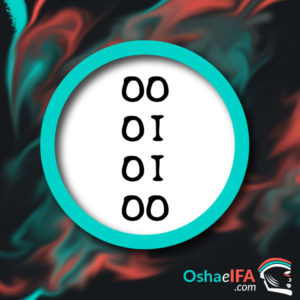


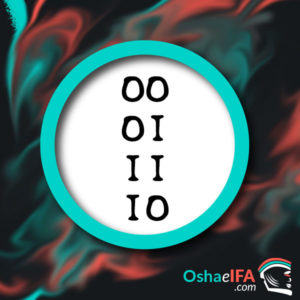


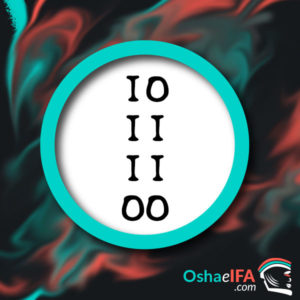

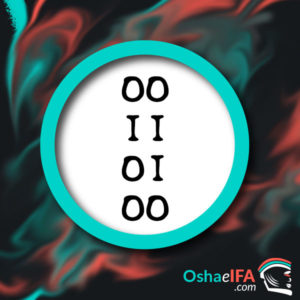
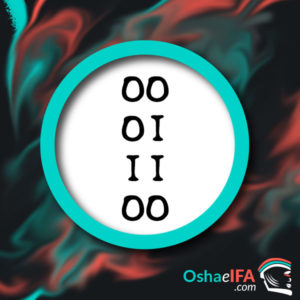


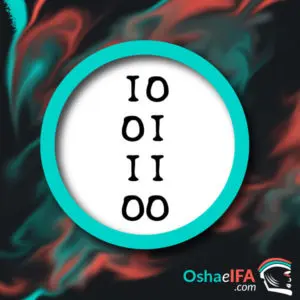
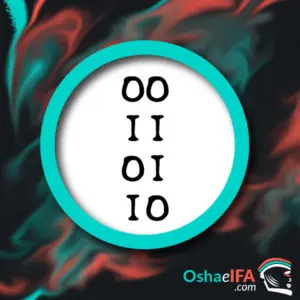
Aboru aboye i greet everyone who has taken there time to py this together i am a living witney to this ifa iwori bogbe that is the ifa that gave birth to me in igbodu
Very good, a great lesson for me